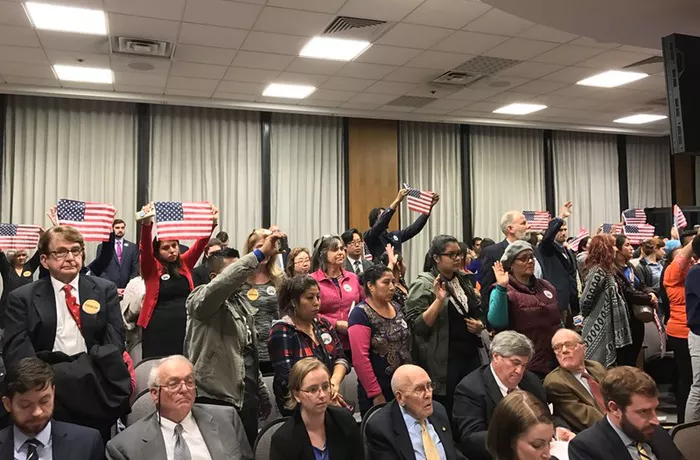RICHMOND, Va. — As Virginia prepares for the upcoming election, immigration has emerged as a key issue for both presidential and congressional candidates. Immigrants make up 16% of Virginia’s workforce, with entrepreneurs representing 29% of “Main Street business owners,” according to a recent report by The Commonwealth Institute. These businesses, typically small storefronts, are vital to the vibrancy of downtown areas.
The study also highlights the significant economic contributions of immigrants, who generate $104 billion in output for the state. Immigrants, by creating job opportunities, help stimulate local economies and benefit U.S.-born workers.
During an Oct. 2 debate at Norfolk State University, Virginia’s U.S. Senate candidates, Tim Kaine (Democrat) and Hung Cao (Republican), shared starkly different views on immigration policy.
Kaine, the incumbent senator, argued that immigration reform could be a key driver of economic growth. “Immigration reform might be the one best thing that Congress can do to expand the American economy,” he said. Kaine emphasized the need to protect the U.S. border while ensuring the country has the workforce it needs for the future. He also criticized the mass deportation plan proposed by former President Donald Trump, which he argued would devastate the economy.
Cao, who emigrated from Vietnam, took a more restrictive stance, focusing on the security and economic consequences of illegal immigration. “If you came here illegally, you are basically screwing up the whole system,” Cao said, noting that immigrants like his family had to wait seven years for their naturalization process. “You cannot jump the line,” he added.
While it is challenging to directly compare immigration data across different administrations, experts note that the way immigration data is tracked has shifted, making comparisons between the Biden administration and previous ones difficult. A report from the Bipartisan Policy Center last December noted that it is not easy to pinpoint how U.S. immigration policies impact illegal immigration.
One of President Biden’s first actions in office was halting the construction of the border wall initiated under Trump and introducing a bill aimed at modernizing U.S. immigration laws. However, the bill failed to pass in Congress, as did a more recent bipartisan effort to secure the border.
Trump’s administration took a harder line on immigration, ending the Deferred Action for Childhood Arrivals (DACA) program in 2017 and imposing a Muslim travel ban in 2018, which the U.S. Supreme Court later overturned. Trump has since pledged to complete the Mexico-U.S. border wall if re-elected.
Immigrants Push for Reform
Several Virginia immigrants shared their thoughts on the need for reform. Valesca Bonilla, a Honduran immigrant and member of CASA in Action, a group advocating for legislative change, said that the Democratic Party has been more receptive to immigrant needs. “The more numbers we are, the better we are together,” she said. She emphasized the importance of small steps toward reform, such as making work permits more accessible and expanding Temporary Protected Status (TPS) for migrants from unsafe countries.
Hector Joya, a Salvadoran immigrant and CASA in Action organizer, echoed Bonilla’s sentiments, calling for greater access to visas and more programs like DACA and TPS to assist immigrants. While he cannot vote, Joya believes many immigrants lean toward the Democratic Party due to its more favorable stance on immigration.
The Complexity of the Immigrant Vote
Gabriela León-Pérez, an assistant professor of sociology at Virginia Commonwealth University, cautioned against viewing immigrants as a monolithic voting bloc. “Naturalized citizens have varied political beliefs, and there is a growing number of Latinos supporting the Republican Party,” she said. León-Pérez’s research shows that while immigrants contribute significantly to the U.S. economy, they come from diverse backgrounds and have different policy preferences based on their country of origin, class, legal status, and immigration history.
León-Pérez emphasized that immigrants complement U.S.-born workers, noting that the jobs immigrants fill are often different from those held by native-born citizens. “They’re not taking jobs; they’re contributing to society,” she said.
Call to Action: Vote for Immigrant Rights
Elizabeth Guzman, a former Democratic delegate from Prince William and Fauquier counties and a naturalized citizen, urged immigrants to vote based on candidates’ positions on immigration. Guzman, who immigrated from Peru, criticized former President Trump’s portrayal of immigrants as a threat to the country. “We are tired of being used for campaign slogans, but never acknowledged for the contributions we’ve made,” she said.
Guzman emphasized that immigrants often work harder to reach higher positions, such as elected office, than their American counterparts. “We’re here to succeed and pave the way for future generations,” she said. Guzman also argued that immigrants should have access to higher education and contribute more to Virginia’s economy by paying taxes and respecting the law.
As Election Day approaches, Guzman urged second-generation immigrants to think about the future they want to create. “Your vote is your voice,” she said. “If you don’t participate, then don’t complain.”
Election Day is Tuesday, Nov. 5. Polls will be open from 6 a.m. to 7 p.m., and same-day voter registration is allowed.
Related topics:
- Donald Trump Discusses Immigration and Elon Musk at Final Rally in Raleigh, N.C.
- Broken Immigration System Takes Center Stage in Presidential Election
- America’s Visa Policies Are Stifling Scientific Progress and Innovation


